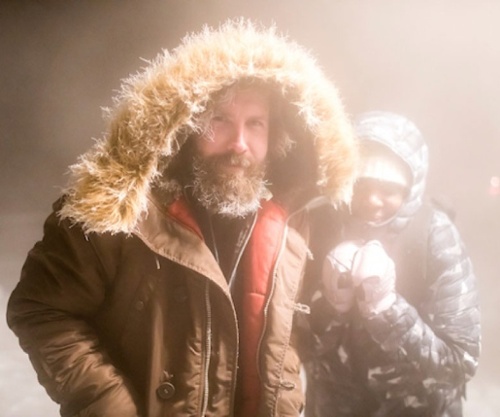
On a recent assignment, Donovan McKnight flew cross-country to Fairbanks, Alaska, to interview employees at the northernmost Walmart store, where winter days see four hours of sunlight and temperatures -30 degrees Fahrenheit. As an editor at Pace Communications in Greensboro, N.C., McKnight tells stories of Walmart employees.
Thanks to the skills he learned in UNCG’s Master of Arts in Liberal Studies (MALS) program, McKnight makes connections in communities all over the country. In 2012, he graduated from the program, now called the Master of Arts in Liberal and Interdisciplinary Studies (MLIS) and fully online. He still leans on those skills today.
“I have to go to these unfamiliar places and readjust my own perceptions in order to tell the story of these people and what they’re doing in their community,” he says. “All of that goes back to MLIS .”
Customizing an interdisciplinary program
Being able to customize the program allowed McKnight to “feed” his interests, matching them to upcoming courses. He studied alongside Master of Fine Arts students and learned about history, fiction writing, biorhythms, design, art, and philosophy.
“It sounds like general education, but at the graduate level you’re studying these at an intensive level,” he says. “I wanted a curriculum that opened me up, instead of narrowing my focus.”
McKnight values the ability to understand unfamiliar concepts, and he looks for it in others. “I’ve found myself in the room with people that might be more talented than me, but I was able to dig in, digest, absorb, process, and then reflect that back out in discussions and writing and work and projects,” he says. “That’s one of the biggest things I learned. It’s a huge skill, and I think it’s gotten me where I am today.”
Using skills in the community
McKnight learned how people interact with space in the program’s online Livable and Sustainable Cities class, where he redesigned a downtown Greensboro block that included a neglected parking lot.
“This is a design class taught so that the average Joe becomes a designer,” he says. “I was able to imagine what I thought that urban block could become based on the principles we were learning about.”
McKnight was able to pull from that course when he was later recruited by Action Greensboro for his input on revitalizing February One Place, the street that runs beside the Woolworth’s where the historic 1960 sit-in movement began. The group developed the honeycomb design now painted on the street in the same colors as the counter stools where the four Greensboro college students waited for service.
“When we were making the case for this placemaking project, I was able to present the concept in a way that I previously wouldn’t have been able to and tie it back to the history of place,” he says of the project. “The promenade has been an integral part of human places for centuries. That’s what we created on February One.”
Applying what he learned
McKnight has long been active in the community. That experience combined with what he gained from the program naturally evolved with the formation of Ethnosh in 2013 as a collaboration with local partners.
It’s a project that introduces the community to international food businesses, and the families that bring them to Greensboro, through monthly events and ethnographic content.
Though Ethnosh came after McKnight finished the program, he says the project was a continuation of his work in the community and what he learned at UNCG.
Photo of McKnight courtesy of Nathaniel Wilder Photography.